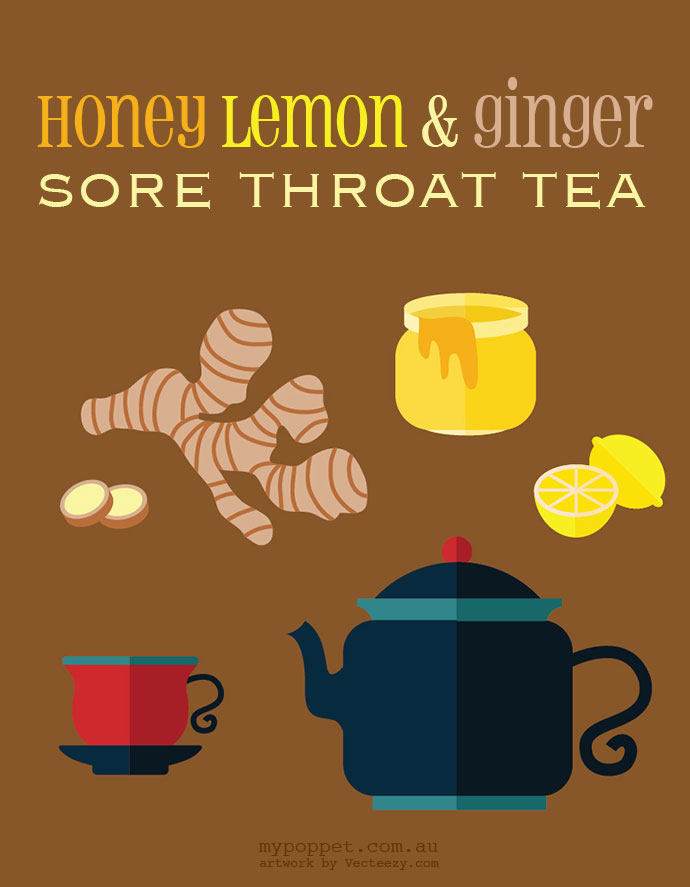Are you tired of that scratchy, uncomfortable feeling in your throat that just won't go away? You're not alone.
Sore throats can be incredibly annoying, disrupting your day and stealing your peace. But what if there was a simple, soothing remedy right in your kitchen? Enter ginger tea – a natural and effective way to ease that soreness and bring relief.
Imagine the warmth of a steaming cup in your hands, the spicy aroma wafting up, and the calming sensation as it soothes your throat. You deserve to feel better, and we're here to show you how ginger tea can be your go-to remedy for a sore throat. Keep reading to discover why this humble root might be the best thing you sip on for relief.

Credit: simplyhoney.com.au
Benefits Of Ginger For Sore Throat
Ginger tea is a popular remedy for sore throats. This natural drink offers many benefits. Ginger's healing properties provide relief and comfort. It not only soothes but also fights infections. Let's explore the benefits of ginger for sore throat relief.
Anti-inflammatory Properties
Ginger contains powerful anti-inflammatory compounds. These compounds reduce throat swelling. They help relieve pain and discomfort. Gingerols and shogaols in ginger fight inflammation effectively. This makes ginger tea an excellent choice for sore throats.
Antimicrobial Effects
Ginger has strong antimicrobial properties. It helps kill bacteria and viruses. This reduces throat infections. Ginger tea helps cleanse the throat. It also boosts the immune system naturally. This makes it a great ally in fighting sore throats.
Soothing Sensations
Ginger tea provides a warm, soothing feeling. This warmth relaxes throat muscles. It eases irritation and scratchiness. The natural oils in ginger calm the throat. Drinking ginger tea feels comforting and pleasant. This makes it a favored remedy for many.

Credit: www.youtube.com
How Ginger Tea Provides Relief
Ginger tea is a natural remedy for sore throats. It brings comfort through its warmth and soothing properties. This herbal drink can ease discomfort and promote healing.
Learn how ginger tea provides relief with its unique benefits.
Heat And Hydration
Warm ginger tea relaxes the throat muscles. The heat from the tea can improve blood flow. This can reduce soreness and swelling.
Drinking ginger tea also keeps you hydrated. Proper hydration helps your body fight infections. It can make a big difference in recovery.
Mucus Reduction
Ginger has natural properties that reduce mucus. Less mucus means less irritation in your throat. This can help you breathe easier and feel better.
Regularly sipping ginger tea can clear your throat. It helps you feel more comfortable throughout the day.
Pain Alleviation
Ginger contains compounds that reduce pain naturally. These compounds can lessen the discomfort of a sore throat.
By sipping ginger tea, you can enjoy gentle pain relief. This makes it easier to eat, drink, and talk.
Making Ginger Tea At Home
Ginger tea serves as a soothing remedy for sore throats. Fresh ginger boiled in water releases natural anti-inflammatory properties, offering relief. Adding honey enhances its calming effect, making it a comforting choice during cold seasons.
Making ginger tea at home is a soothing remedy for sore throats. Fresh ginger root offers natural healing properties. It brings relief and comfort quickly. Creating this tea is simple and rewarding. With a few easy steps, enjoy a warm, healing drink. Enhance it with extra ingredients for added flavor and benefits.Choosing Fresh Ginger
Select ginger root that looks firm and smooth. Check the skin for no wrinkles. Fresh ginger has a spicy aroma. Avoid pieces that feel soft or mushy. Opt for organic ginger if possible. It ensures purity and quality.Simple Preparation Steps
Wash the ginger under cold water. Peel the skin with a spoon or peeler. Slice the ginger thinly. Boil water in a pot. Add the ginger slices to the boiling water. Let it simmer for 10 minutes. Strain the tea into a cup. Drink it warm for best results.Enhancing With Additional Ingredients
Add honey for sweetness and soothing effects. Include lemon juice for extra vitamin C. Sprinkle some cinnamon for flavor. Consider adding turmeric for anti-inflammatory benefits. Try mint leaves for a refreshing taste. Adjust these ingredients to suit your preference.Instant Relief Tips
Ginger tea soothes sore throats quickly. Its natural anti-inflammatory properties reduce throat irritation. Sip warm ginger tea for instant comfort.
When you're battling a sore throat, ginger tea can be your go-to remedy. Not only is it soothing, but it also offers instant relief. Let's dive into some practical tips that can help you maximize the benefits of ginger tea for your throat.Adding Honey And Lemon
Enhancing your ginger tea with honey and lemon is a game-changer. Honey coats your throat, providing a soothing effect almost immediately. Lemon adds a refreshing twist while boosting your immune system with vitamin C. Try this: Add a teaspoon of honey and a slice of lemon to your steaming cup of ginger tea. Stir well and enjoy the comforting warmth as it eases your discomfort. Have you noticed how a simple addition can make such a big difference?Using Ginger Tea Gargle
Gargling with ginger tea can target your sore throat more directly. It helps clear out mucus and reduces inflammation. To make this gargle, brew a strong cup of ginger tea and let it cool slightly. Gargle a sip for about 30 seconds before spitting it out. Repeat until the cup is empty. This quick practice can provide relief, especially before bedtime.Incorporating Herbal Infusions
Why not experiment with herbal infusions to enhance your ginger tea? Adding herbs like chamomile or peppermint can amplify the soothing effects. Simply steep a chamomile tea bag or some peppermint leaves along with your ginger. This not only adds flavor but also brings extra calming benefits. Have you tried mixing herbal infusions with your ginger tea yet? It's a delightful way to customize your remedy. These instant relief tips can transform your ginger tea into a powerful ally against sore throat discomfort. Remember, small tweaks can lead to big relief. Which tip will you try first?Precautions And Considerations
Ginger tea can soothe a sore throat, but check for allergies first. Drinking too much may upset your stomach.
Ginger tea is often praised for its soothing properties, especially when you're battling a sore throat. However, like with any remedy, there are precautions and considerations to keep in mind. Understanding these can ensure that you get the most out of this natural remedy without any unintended consequences. Let’s dive into the potential side effects, suitable dosages, and when you should seek medical advice.Potential Side Effects
While ginger tea is generally safe, it can cause mild side effects in some individuals. You might experience heartburn, stomach upset, or diarrhea. If you are new to ginger, start with small amounts to see how your body reacts. Drinking ginger tea excessively can lead to more pronounced effects, such as irritation in your mouth or throat. These side effects are rare but worth considering. Remember, moderation is key with any remedy. Have you ever felt a mild burning sensation after drinking ginger tea? This might be your body's way of saying "slow down."When To Seek Medical Advice
If your sore throat persists despite using ginger tea, it may be time to consult a healthcare professional. A sore throat lasting more than a week could signal something more serious. Experiencing difficulty swallowing or breathing after consuming ginger tea should prompt immediate medical attention. These reactions are not common but should not be ignored. Taking note of your symptoms and how they respond to ginger tea can be helpful when discussing your condition with a doctor. Trust your instincts and seek advice when something doesn’t feel right.Suitable Dosages
A common question is, how much ginger tea is too much? Typically, consuming 1-2 cups a day is safe for most people. This provides enough ginger to soothe your throat without overwhelming your system. If you prefer using fresh ginger, a slice or two in boiling water is usually sufficient. For those using ginger powder, a teaspoon per cup should suffice. Adjust the strength of your tea based on your taste and tolerance. Have you ever noticed how some days a stronger cup feels just right, while other days a milder version is more comforting? Listen to your body, and let it guide your choices.
Credit: mypoppet.com.au
Additional Natural Remedies
Ginger tea offers soothing relief for sore throats with its anti-inflammatory properties. Brew fresh ginger slices in hot water and sip slowly. Its natural warmth and spice help ease discomfort and promote healing.
When you're battling a sore throat, ginger tea can offer soothing relief. But sometimes, you may need a little extra help. Luckily, there are other natural remedies that you can try to ease the discomfort. These remedies can work alongside ginger tea to help you feel better faster. Let's explore them!Salt Water Gargle
A salt water gargle is a simple yet effective remedy. Mix half a teaspoon of salt in a glass of warm water. Gargle with this solution for a few seconds, then spit it out. This method helps reduce throat swelling and loosens mucus. It might not be the tastiest option, but it’s worth a try.Chamomile Tea Benefits
Chamomile tea is not just for relaxation. It has anti-inflammatory properties that can soothe your sore throat. Brew a cup and let it cool slightly before sipping. The warmth can ease pain, while the antioxidants may help your body fight off illness. Plus, it’s caffeine-free, making it a great choice before bedtime.Eucalyptus Steam Inhalation
Inhaling eucalyptus steam can provide relief for your sore throat. Add a few drops of eucalyptus oil to a bowl of hot water. Lean over the bowl, cover your head with a towel, and breathe in the steam. This method can help clear your nasal passages and soothe throat irritation. Just be cautious with the hot water to avoid burns. Do any of these remedies remind you of something your grandmother might suggest? Sometimes, the simplest solutions are the most effective. Which one will you try next?Frequently Asked Questions
How To Make Ginger Tea For Babies?
Boil water and add a small piece of fresh ginger. Simmer for 5-10 minutes. Strain the liquid and let it cool. Add a little honey for babies over one year. Ensure the tea is lukewarm before serving. Consult a pediatrician before introducing ginger tea to your baby.
When Not To Drink Ginger Tea?
Avoid ginger tea during pregnancy, breastfeeding, or if you have gallstones. It may cause heartburn or stomach upset. Consult your doctor if taking blood thinners or diabetes medication.
Can I Just Put Ginger In Hot Water?
Yes, you can put ginger in hot water to make a soothing tea. Slice fresh ginger and steep in boiling water for 5-10 minutes. This ginger tea can help with digestion and boost immunity. Adding lemon or honey can enhance flavor and benefits.
Enjoy this simple, warming drink.
How To Make Ginger For The Throat?
Boil water and add sliced ginger. Simmer for 10 minutes and strain. Add honey and lemon juice. Drink warm for soothing the throat. Ginger reduces inflammation and relieves soreness effectively.
Conclusion
Ginger tea offers a soothing relief for sore throats. Its natural properties help reduce inflammation. Warm ginger tea comforts and relaxes the throat. Prepare easily by boiling fresh ginger slices. Add honey for sweetness and extra soothing effect. Drink slowly to enjoy full benefits.
Regular intake supports healing and boosts immunity. A simple remedy for discomfort. Remember to consult a doctor if symptoms persist. Ginger tea can be a helpful addition to your routine. Embrace the warmth and comfort it provides. Stay healthy and enjoy the natural benefits.
Disclaimer: This article is for educational and informational purposes only. The home remedies mentioned here are based on traditional practices and general wellness knowledge. They are not a substitute for professional medical advice, diagnosis, or treatment. Always consult a qualified healthcare provider before trying any new remedy, especially if you are pregnant, nursing, or taking medications.
